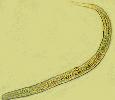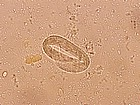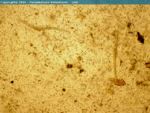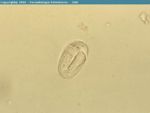Difference between revisions of "Strongyloidea"
Jump to navigation
Jump to search
| Line 17: | Line 17: | ||
[[Image:Strongyloides.jpg|thumb|right|150px|''Strongyloides'' - Joaquim Castellà Veterinary Parasitology Universitat Autònoma de Barcelona]] | [[Image:Strongyloides.jpg|thumb|right|150px|''Strongyloides'' - Joaquim Castellà Veterinary Parasitology Universitat Autònoma de Barcelona]] | ||
*Bursate | *Bursate | ||
| + | *Large buccal capsule | ||
*Relatively short (typically 1-5cm) but stout | *Relatively short (typically 1-5cm) but stout | ||
| − | *Heads often have characteristic features | + | *Heads often have characteristic features - teeth or cutting plates |
== General Life-Cycle == | == General Life-Cycle == | ||
Revision as of 19:09, 15 January 2010
| This article is still under construction. |
|
|
General Appearance
- Bursate
- Large buccal capsule
- Relatively short (typically 1-5cm) but stout
- Heads often have characteristic features - teeth or cutting plates
General Life-Cycle
- Like that of the trichostrongyloids (eggs are also 'typical strongyle eggs'), but:
- L3 → L4 → adult (typically occurs in the large intestine)
- Larvae penetrate the mucosal wall and elicit nodule formation
- Larvae of some species migrate around the body
- Prepatent period varies between species from 3 weeks to over 6 months
Peritonitis in sheep by penetration of intestines by larvae of Oesophagostomum columbianum
Strongylus edentatus and Strongylus equinus migrate through Peritoneal Cavity Parasitic - Pathology
Stephanuris dentatus causes peritonitis in pigs Peritoneal Cavity Parasitic - Pathology and may cause cysts in the pancreas
Syngamus laryngeus in larynx of cattle



